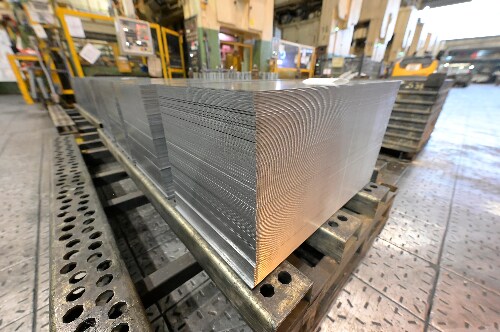
Finding ways to promote sustainability and eco-friendliness has been a major driving force behind Ford’s operations in recent years. Clean and sustainable automotive production is more important than ever, and Ford’s ambitious goals in terms of carbon neutrality and waste management are important milestones towards achieving a better future. Recently, Ford of Europe made an important step in this direction by entering a Memorandum of Understandings with three steel suppliers– Salzgitter Flachstahl GmbH, Tata Steel Nederland B.V. and ThyssenKrupp Steel Europe AG– to secure a supply of low carbon steel.
Ford of Europe’s target year to achieve total carbon neutrality is 2035, and acquiring this low carbon steel is a crucial part of that process. Carbon output must be reduced across the entire manufacturing process, including the supply chain.
Each of the suppliers has plans of their own to increase production of low carbon steel in the coming years. Ford has committed to using at least 10% carbon neutral steel by 2030, so this will be important as well. In Europe there is currently an all-new, all-electric, medium-sized crossover in the works for 2023, and this will be one of the first planned uses for the new low carbon steel. The suppliers will be using green hydrogen, renewable energy sources, and new production processes to reduce their carbon emissions, helping to contribute to the European Green Deal.
Ford joined the First Movers Coalition in 2022, a global initiative by the World Economic Forum meant to help create early markets for clean energy technologies, as a way to help further their environmental goals. The company is also analyzing its entire value chain to look for opportunities to produce more efficient vehicles, including making major updates to the Cologne Electrification Centre in Germany, where new energy efficient solutions are expected to save over 2,600 MWh of electric energy annually.
“Our customers, like us, want to take care of our planet, and we are taking the necessary steps on this journey, providing the vehicles they need to make a positive contribution against climate change, produced in a more sustainable way,” said Sue Slaughter, purchasing director, supply chain sustainability, Ford Motor Company. “Improvements within our supply chain are key, and with the use of carbon neutral steel we will take a major step towards lowering the CO2 footprint of our vehicles.”
To keep up with the latest Ford news stories like this, make sure to continue reading our blog at Haldeman Ford East Windsor!